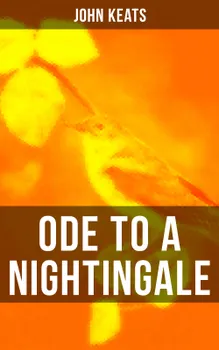In John Keats' 'Ode to a Nightingale,' the reader is taken on a lyrical journey through the beauty and suffering of life. Keats masterfully intertwines themes of nature, mortality, and art, creating a rich tapestry of emotions and philosophical ponderings. The poem's use of vivid imagery and complex symbolism places it firmly within the Romantic literary tradition, while its exploration of the fleeting nature of life gives it a timeless quality that continues to resonate with readers today. Keats' beautiful and poignant language captures the essence of human experience and invites readers to reflect on their own place in the world. Through the nightingale's song, Keats weaves a poignant meditation on the transience of beauty and the power of art to transcend the limitations of mortality. John Keats, a prominent Romantic poet, drew inspiration for 'Ode to a Nightingale' from his own experiences with loss and longing. His intimate connection to nature and his keen sense of observation are evident in the detailed and evocative descriptions found throughout the poem. Keats' personal struggles with illness and mortality infuse his work with a deep sense of melancholy and introspection, inviting readers to contemplate the complexities of existence alongside him. I highly recommend 'Ode to a Nightingale' to readers interested in exploring the depths of human emotion and the power of poetry to illuminate the mysteries of life. Keats' timeless meditations on beauty, mortality, and art offer a profound and moving experience that continues to captivate and inspire readers centuries after its publication.

90 Masterpieces You Must Read (Vol.1) : Novels, Poetry, Plays, Short Stories, Essays, Psychology & Philosophy: The Madman, Moby-Dick, Siddhartha, Crime and Punishment, Hamlet, Great Expectations, Little Women, Meditations, The Einstein Theory, Heart of Darkness, The Red Badge of Courage
Walt Whitman, Herman Hesse, George Eliot, Kahlil Gibran, Anton Chekhov, Herman Melville, Oscar Wilde, Fyodor Dostoevsky, Nikolai Gogol, James Joyce, Henry David Thoreau, William Shakespeare, T. S. Eliot, John Keats, Charles Baudelaire, Walter Scott, Daniel Defoe, Louisa May Alcott, Jane Austen, Charlotte Brontë, Emily Brontë, Anne Brontë, Leo Tolstoy, Benito Pérez Galdós, William Makepeace Thackeray, Pierre Choderlos de Laclos, R.D. Blackmore, Alexandre Dumas, Marcel Proust, D. H. Lawrence, Charles Dickens, Thomas Hardy, Henry James, Guy de Maupassant, Princess Der Ling, Victor Hugo, Juan Valera, Anthony Trollope, Stephen Crane, E. M. Forster, Theodore Dreiser, Margaret Cavendish, Upton Sinclair, Plato, Apuleius, Marcus Aurelius, Sun Tzu, Voltaire, Miguel de Cervantes, Giovanni Boccaccio, Frederick Douglass, Sigmund Freud, H. A. Lorentz, Wallace D. Wattles, James Allen, Agatha Christie, Arthur Conan Doyle, Joseph Conrad, H. P. Lovecraft, Washington Irving, Mary Shelley, H. G. Wells, Edgar Allan Poe, Ernest Hemingway, L. Frank Baum, Robert Louis Stevenson, Mark Twain, Selma Lagerlöf, Jack London, Jules Verne, Lewis Carroll, Frances Hodgson Burnett, Rudyard Kipling, George Bernard Shaw, Soseki Natsume, Johann Wolfgang Goethe, Edgar Rice Burroughs, Brothers Grimm, Hans Christian Andersen
book
Lyrikalische Lesung Episoden 91-95
Arno Holz, John Keats, Annette von Droste-Hülshoff, Charles Baudelaire, Rainer Maria Rilke
audiobook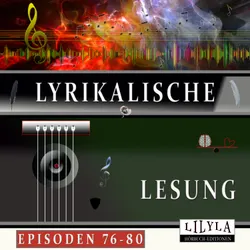
Lyrikalische Lesung Episoden 76-80
Christian Morgenstern, Karl Kraus, Wolfgang Borchert, Kurt Tucholsky, Annette von Droste-Hülshoff, John Keats, Rainer Maria Rilke
audiobook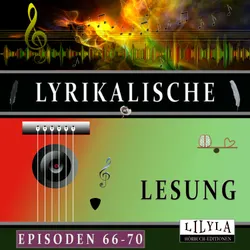
Lyrikalische Lesung Episoden 66-70
John Keats, Wilhelm Busch, Ludwig Tieck, Rainer Maria Rilke, Johann Wolfgang von Goethe
audiobook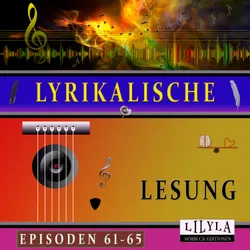
Lyrikalische Lesung Episoden 61-65
Wilhelm Busch, Joachim Ringelnatz, Arno Holz, John Keats, Charles Baudelaire, Annette von Droste-Hülshoff, Else Lasker-Schüler, Georg Heym, Heinrich Heine
audiobook
Lyrikalische Lesung Episoden 56-60
Johann Wolfgang von Goethe, John Keats, Annette von Droste-Hülshoff, Arno Holz, Wilhelm Busch, Georg Heym, Heinrich Heine, Franz Werfel, Charles Baudelaire, Rainer Maria Rilke, Friedrich Nietzsche, Hugo von Hofmannsthal, Edgar Allan Poe
audiobook
Lyrikalische Lesung Episoden 46-50
Ludwig Kalisch, Else Lasker-Schüler, Annette von Droste-Hülshoff, Edgar Allan Poe, Charles Baudelaire, Hugo von Hoffmannsthal, Arno Holz, John Keats, Heinrich Heine, Karl Kraus, Georg Heym, Joachim Ringelnatz, Ludwig Tieck, Franz Werfel, Kurt Tucholsky, Johann Wolfgang von Goethe, Rainer Maria Rilke, Jakob van Hoddis, Wilhelm Busch
audiobook
Lyrikalische Lesung Episoden 41-45
Karl Kraus, Charles Baudelaire, Rainer Maria Rilke, Wolfgang Borchert, Georg Trakl, Wilhelm Busch, John Keats, Georg Heym, Annette von Droste-Hülshoff, Else Lasker-Schüler, Heinrich Heine, Johann Wolfgang von Goethe, Arno Holz, Friedrich Nietzsche, Stefan Zweig, Ludwig Tieck, Frank Wedekind, Joachim Ringelnatz, Christian Morgenstern
audiobook
Lyrikalische Lesung Episoden 36-40
John Keats, Georg Heym, Annette von Droste-Hülshoff, Wilhelm Busch, Joachim Ringelnatz, Arno Holz, Stefan Zweig, Rainer Maria Rilke, Edgar Allan Poe, Ludwig Tieck, Charles Baudelaire, Frank Wedekind, Ludwig Kalisch, Heinrich Heine, Kurt Tucholsky, Franz Werfel, Johann Wolfgang von Goethe
audiobook
Lyrikalische Lesung Episoden 31-35
Heinrich Heine, Johann Wolfgang von Goethe, John Keats, Hugo von Hoffmannsthal, Charles Baudelaire, Wilhelm Busch, Christian Morgenstern, Arno Holz, Georg Heym, Annette von Droste-Hülshoff, Karl Kraus, Georg Trakl, Ludwig Tieck, Joachim Ringelnatz, Rainer Maria Rilke
audiobook
Lyrikalische Lesung Episoden 16-20
John Keats, Christian Morgenstern, Joachim Ringelnatz, Wilhelm Busch, Kurt Tucholsky, Annette von Droste-Hülshoff
audiobook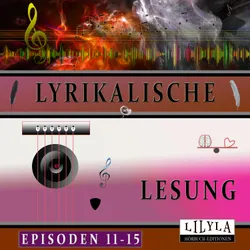
Lyrikalische Lesung Episoden 11-15
Edgar Allan Poe, Charles Baudelaire, Annette von Droste-Hülshoff, John Keats, Joseph von Eichendorff, Christian Morgenstern, Joachim Ringelnatz, Johann Wolfgang von Goethe, Kurt Tucholsky, Wilhelm Busch
audiobook
